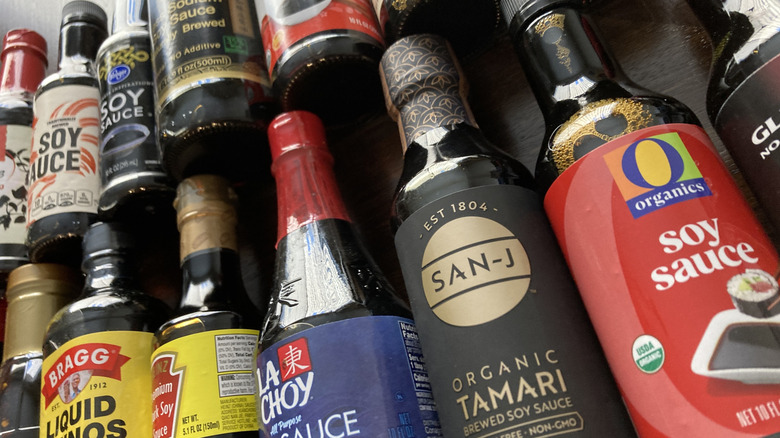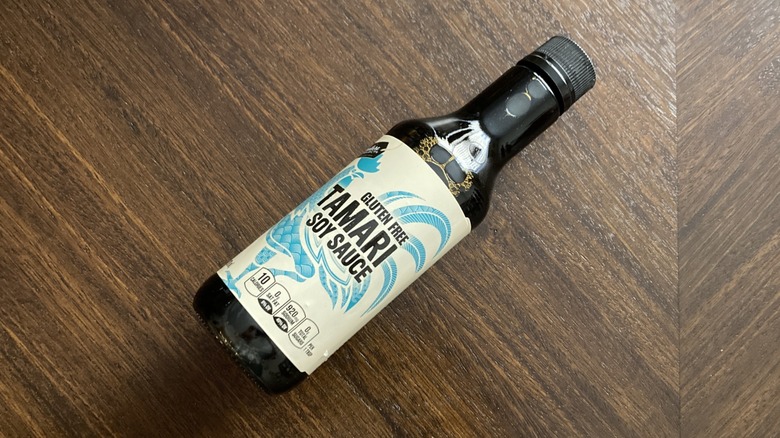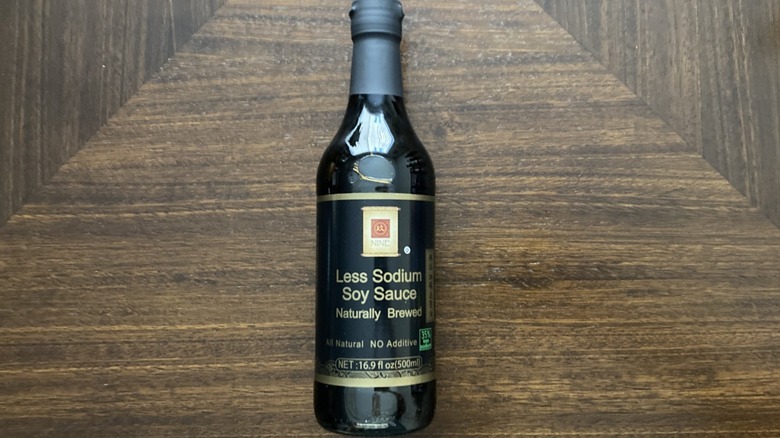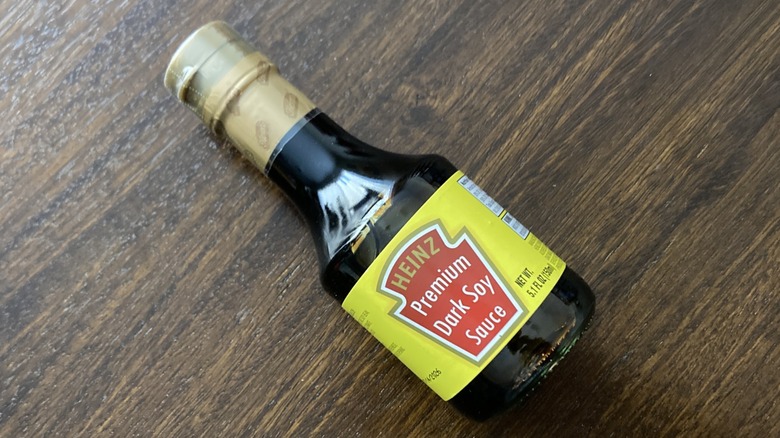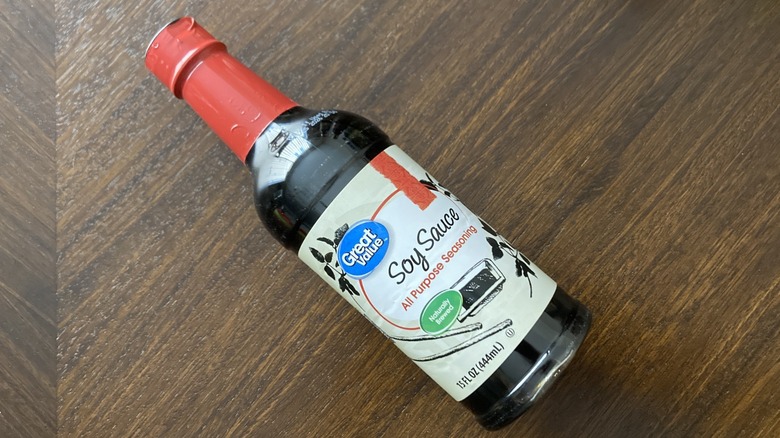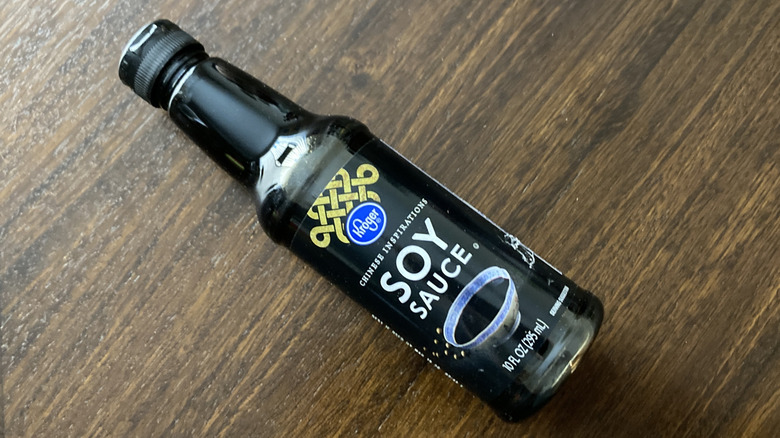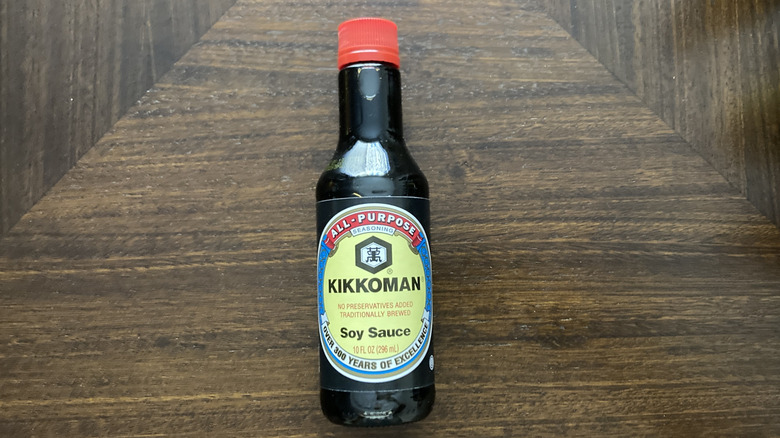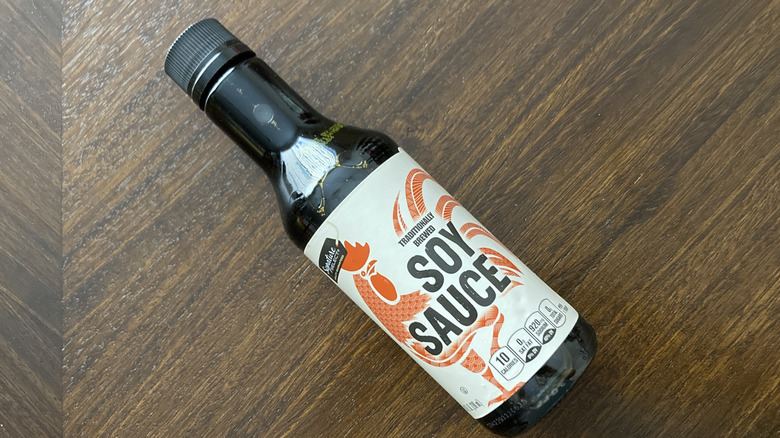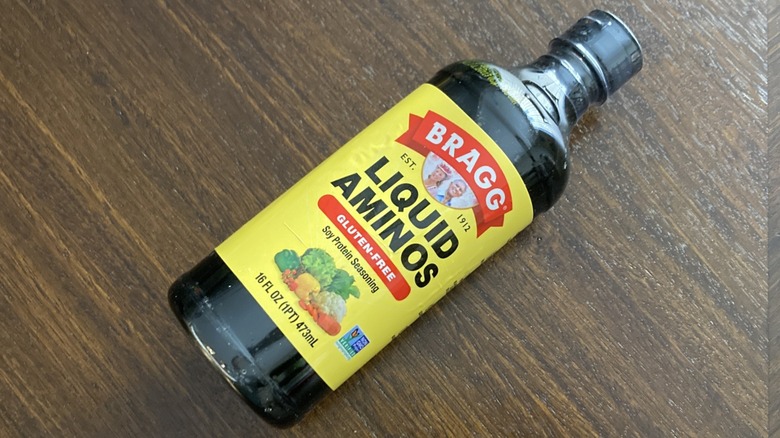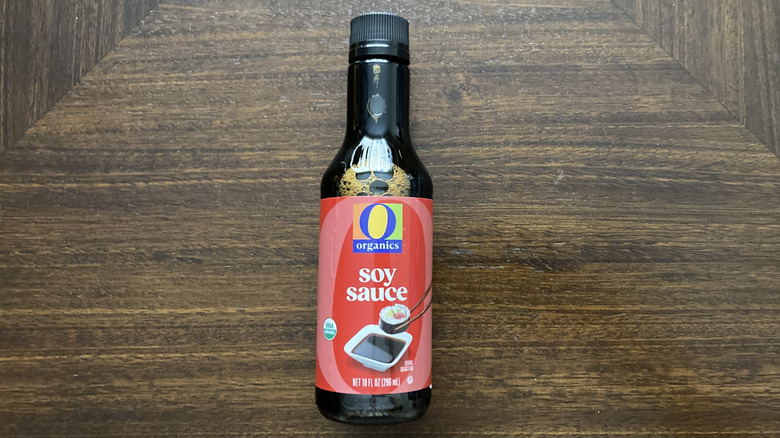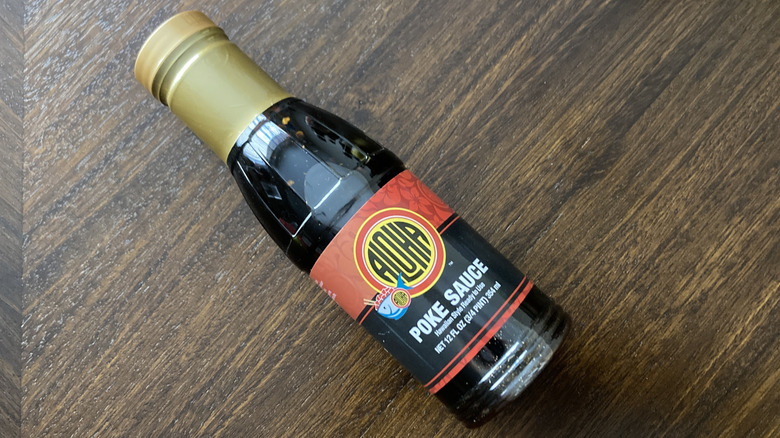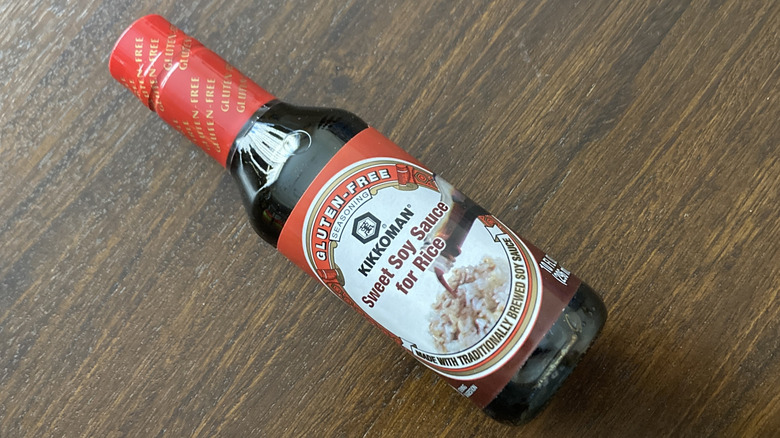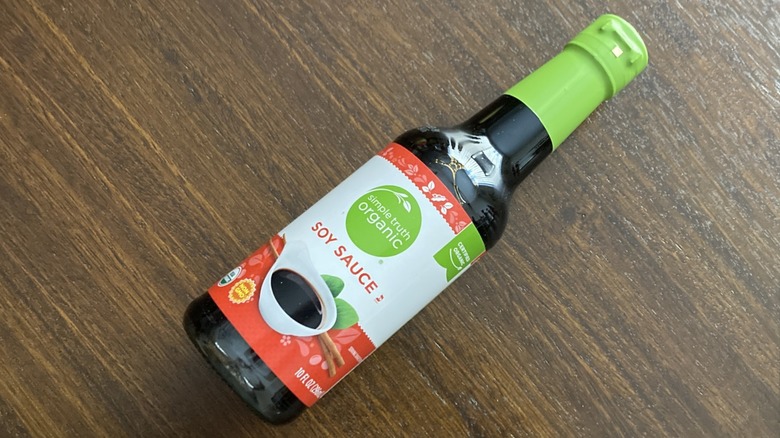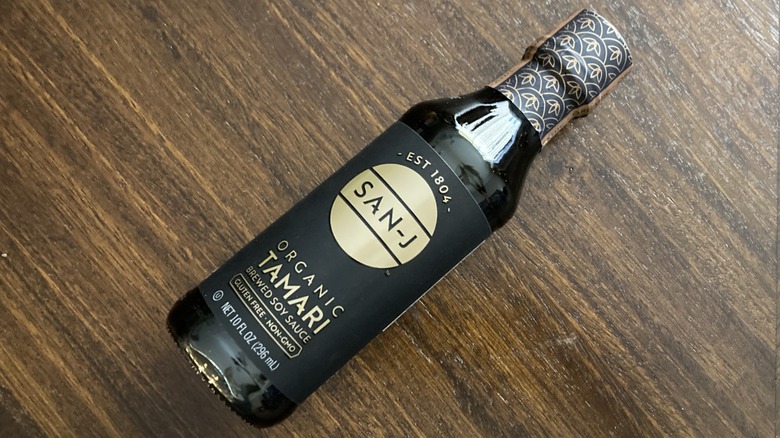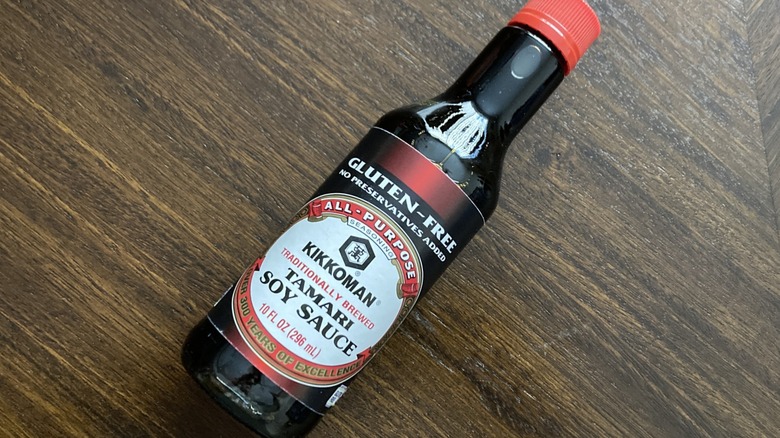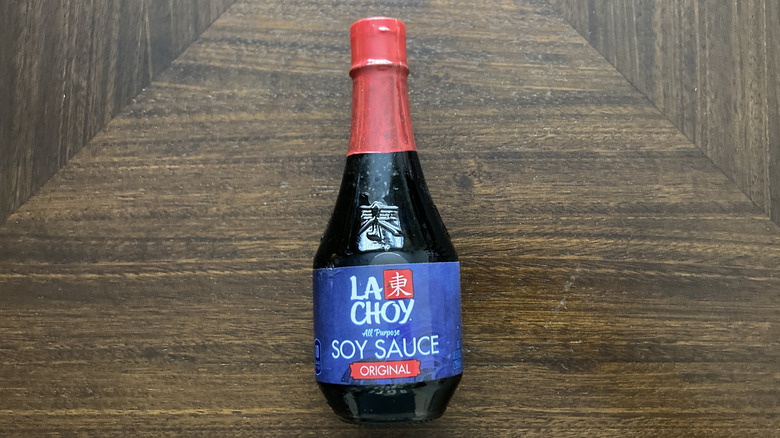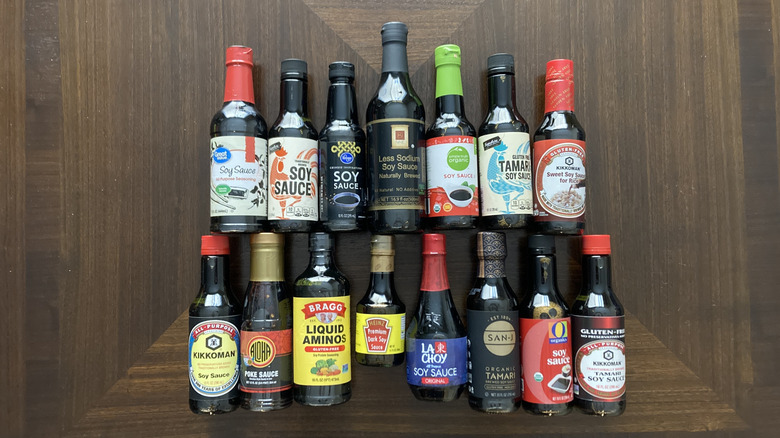Popular Soy Sauce Brands, Ranked From Worst To Best
With so many soy sauce brands lining supermarket shelves, buying the right one is similar to shopping for a car; they're all going to get you where you're going, but some provide a more enjoyable ride than others. It's a singular challenge to enter the Asian food aisle and know everything you need to know about soy sauce from each brand and what it offers to your favorite dishes.
To help you avoid making mistakes by cooking with soy sauce that might be subpar, I did a swing-by around my neighborhood grocery locations and picked up a solid 15 bottles for a soy sauce taste test. You might think the only thing differentiating these salty shake-ons from one another are the labels, but you would be soy — er, so — mistaken. There's a distinction to be made between the variety of brands on the market, and after sampling this selection on nothing more than plain brown rice, a saucy ranking has emerged with an inevitable victor climbing to the top of the food chain.
15. Signature Select Tamari
For those wondering what tamari sauce is compared to regular soy sauce: it's a version made from fermented miso paste rather than soybeans. The result is intended to be a more even-handed version of similar tasting notes, a notion that Signature Select puts on the table with its own tamari blend. Having more than one soy sauce concept to choose from should be a win for home chefs, but it only works when the juice in the bottle works its magic for real — and Signature Select really doesn't.
Don't be fooled by the word tamari on the label ... come to think of it, don't be fooled by the word soy sauce, either. This is the most watery, unflavored sauce I've ever tasted, among the other bottles I tested and beyond. I would ordinarily write it off to the fact that I tasted it late in the testing but the other flavors kept coming through from the other bottles and brands. I can only conclude that Signature Select flubbed the formula for tamari. Signature Select is a definite no-go.
14. Nine Less Sodium
I wasn't familiar with the Nine brand before researching my soy sauce selections. After sampling this bottle, I don't think I'll become any more familiar with it, either. The company offers a larger-than-average bottle for a decent price (I paid about $4 for mine), and the lower sodium should be an attractive quality for those watching their intake. Too bad the quality doesn't live up to its potential.
It seems as though the manufacturers took the flavor out of the sauce along with the sodium. It's really difficult to taste anything other than water and a sort of stale flat brown taste, if a color can have a signature taste (blue and red notwithstanding). If a bottle of Nine has anything to say about it, brown isn't a flavor designed for enjoyment, even if it does offer a reduced sodium option. Don't settle for a so-so soy sauce like this when you can do so much better.
13. Heinz Premium Dark
If the rule of darkness denoting flavor holds as true for soy sauce as for other culinary creations, then Heinz Premium Dark should be a home run of a table-topper. With a reputation for great ketchup and cocktail sauces, it's an easy reach to think this staple brand could easily conquer an Asian add-in to expand its condiment line. Yet the excitement of finding this diminutive bottle among the bigger bottles turned to sheer disappointment when the taste test revealed the irony that this so-called dark sauce has even less flavor than its standard cohort.
Who would've thought it possible to be ghosted by a soy sauce? If the intention of Heinz premium dark soy sauce is to be a wallflower in the world of flavor, then it comes through with flying colors. But if a more prominent essence is what makes or breaks your dish, then this whisper of a soy sauce is closer to a steak sauce than anything you'd include in your preferred Asian creations, and even using it on steak seems like a stretch.
12. Great Value
If all you're looking for is a salty-umami element to toss your stir-fry vegetables around in, Great Value would love for you to consider its price-friendly soy sauce as a possibility. At under $2, it's one of the most affordable bottles on any store shelf. But unless you want to do a lot of tap dancing in the kitchen to get your final dish to be something more than a mess, you should go for quality over economy and opt for a more polished product from another brand.
Fantastic price and wide-ranging availability aside, the food makers behind the Walmart curtain just don't seem to have a firm grasp on what makes a well-balanced soy sauce. This one is tart and salty from the get-go and doesn't settle down even after it's been on your tongue. If there's such a thing as a nuisance in the world of soy sauce, this bargain brand wears the banner.
11. Kroger
Store-label items at Kroger come in so many varieties, it's hard to tell if the chain is competing against itself more than bigger-name brands. Grabbing a bottle of Kroger soy sauce may seem like a sensible thing to do, considering the relatively dependable quality of the other offerings from this no-frills label, as well as the budget-beating price. But a no-frills move in the soy sauce world ends up doing Kroger no favors, which means you'll be bearing the brunt of a soy sauce that can't get up to speed.
The biggest thing working against this sauce is the distinctly fishy essence, a particularly unwelcome layer in a world of sauces that do sometimes intentionally include fish as part of the flavor base. Unless the dish benefits from this potentially undesirable punch, Kroger soy sauce could be dropping a whole heap of no-thank-you into your lunch or dinner plans. And if there's one thing you don't want in your favorite Chinese food recipes that beat takeout, it's unintended fish flavor.
10. Kikkoman
I grew up with Kikkoman soy sauce as a staple in the family fridge. Anytime we enjoyed takeout or homemade Chinese food, the bottle appeared on the table like magic to make things more flavorful. Though my younger palate balked at such a strong flavor, I always held it in high regard for its permanent presence. It was like a family member that came to visit and never left, preferring the cold climes of our Frigidaire.
Little did I know how unimpressive Kikkoman's elementary soy sauce really is. Retasting it as an adult, it was easy to recall why I didn't like it: It's tangy and a tad salty, but mostly just provides a garble of background noise for my taste buds. This could be a good thing for cooks who don't want the sauce overpowering the other flavors in their dishes, but it also means Kikkoman doesn't stand up as a showstopping sauce all on its own.
9. Signature Select
Albertsons gives the idea of soy sauce an admirable go with this zesty version from its house brand portfolio. Since Signature Select items can be a hit-or-miss situation and the tamari turned out to be a big disappointment, I didn't hold out much hope for the basic brew. But it does a slight bit better as a straightforward soy sauce, even if it doesn't ascend to the heights of the other movers and shakers in the soy sauce sphere.
What works: There's a fun taste at the heart of the sauce that I had to search a little to find. What doesn't work: that joyful flavor is drowned out by too much saltiness that could do well with a bit of a smoky element to play against. In total, it's a soy sauce I might incorporate into a dressing or marinade that takes on other elements, like citrus juice or honey, to give a more well-rounded personality to the finished product. On its own, Signature Select isn't a top-line choice for simple soy sauce needs.
8. Bragg Liquid Aminos
Home chefs who've explored options beyond the usual soy sauce for their favorite umami-rich recipes may have run into Bragg Liquid Aminos and wondered how it fits into the greater soy scheme. The label calls out that this blend is made from a gluten-free soybean-based vegetable protein and water and nothing else, as opposed to the soybean fermentation used by other soy sauces to give soy sauce-based recipes an umami punch.
The intention is to provide a healthy version of a familiar sauce, but Bragg could stand to pull back on the sodium quite a bit. The super saltiness I picked up in just a small taste delivered a powerful poke in the tongue, though the smokiness that followed was more pleasing than many of the other brands I tried. After hearing about Bragg for several years, it's good to know that there's a workable alternative to purchase should the other brands be missing from the shelves. But I wouldn't forgo straight-up soy sauce in favor of this one.
7. O Organics
Does an organic version of soy sauce make a difference when it comes to flavor and usability in the kitchen? O Organics soy sauce from the Albertons-Safeway operation sure seems to believe it does. Anyone who's relieved by eating as organically as possible, especially when it comes to bottled products like sauces and seasonings, will be happy to keep aligned with their principles when shaking soy sauce onto their savory specialties. And O Organics does an admirable job with soy sauce overall, organic or otherwise.
It's impossible to tell if the organic nature of the sauce has a positive impact on the final product or if this sauce is just a sturdier creation, but this one really brings the flavor to the food. There's a lovely balance here that reminds me of Worcestershire but without all the extra bells and whistles. If it were just a little bolder, it could have hopped up higher in the ranking. But what it does, it does well.
6. Aloha Poke
Reading the name Aloha Poke provided my first clue that this would be no ordinary soy sauce. The fact that it makes no mention of soy sauce at all on the label was a bit of head-scratcher; why was I finding it among the other soy-based sauces if it wasn't going to present as a competitor? A glance at the label revealed that this soy-adjacent sauce includes extra elements to give more than the usual experience, which turned out to be a blast, even on nothing but brown rice.
Anyone looking for a soy sauce that comes with its own special kick, that keeps them from having to create one of their own, should make sure to check out this bright bottle. With ginger, lemon juice, and chile flakes added to the mix, this combination of savory and spicy gives a wonderful blast of fun to the ordinary soy sauce profile. The result is a premixed Asian delight that could go just as well on beef or chicken as the contents of an actual poke bowl, a smooth move that could help sushi beginners up their game.
5. Kikkoman Sweet Soy Sauce for Rice
With the basic Kikkoman concoction underperforming, I was prepared for the sweet version to do similarly. How much better could a touch of sweetness be in a sauce that's just okay? What I discovered as I tested Kikkoman Sweet Soy Sauce for Rice was that Kikkoman itself is a great base for more complex sauces like this one. All the fundamental recipe needed was a dose of sugar to bring out its better nature, and this bottle keeps you from having to tinker in order to achieve a tastier take.
The flavor rides the line between soy sauce and teriyaki sauce, thanks to the inclusion of sugar and rice syrup. It's just enough to take the bite out of the saltiness but not so heavy that it overpowers the umami soy layers. This is a selection I would gladly keep in my refrigerator to jazz up white rice with a sprinkle of peanuts on top, or when rediscovering what edamame is when given a touch of sweetness. It's a great topping for modest dishes that need a dash of intricate flavor straight out of the bottle.
4. Simple Truth Organic
Kroger hauls out its attempt at an organic soy sauce and comes up with a real winner. I've had great success with other Simple Truth Organic items, but I'm still leery when trying something new from the line, always expecting that my luck will run out with the next item on the carousel. It's a tasty surprise to find out Simple Truth soy sauce keeps the successful streak, bottling up one of the more sophisticated taste blends on the list.
I don't know how those clever food formulators managed to do it, but somehow, this organic bottle starts off with the aroma of pineapple, despite the absence of pineapple juice in the recipe. It's a fun additional element in what turns out to be a very salty but overall enjoyable soy sauce that I would definitely use in a stir-fry or basic rice bowl to add dazzling flavor to unadorned veggies. The flavor more than justifies the slightly elevated price of the bottle.
3. San-J Organic Tamari
San-J packages its stylish tamari soy sauce in a sleek black label with modern gold graphics, bucking the trend of traditional sauces that aim for nostalgia. Good on this producer for getting its marvelous mashup of miso and soy to stand out on shelves. And in a stroke of good fortune, the sauce in the bottle is as optimal as the shiny graphics on the sticker.
It's reassuring to taste a premium soy sauce at a premium price (close to $5) that delivers premium flavor. The contents of the bottle offer saltines and the umami you'd expect, but they're so accurately dialed in that they don't compete with one another. Instead they create flavor harmonics that don't overwhelm, allowing you to go back for multiple bites without overworking your taste buds. I would definitely opt for this bottle when cooking a more upscale dish.
2. Kikkoman Tamari
Kikkoman moving into tamari territory should be a no-brainer, considering the hold the company has on the soy sauce sector. Even with a middling basic brand, the food figure-outers here have found a way to make a tasty tamari that does the label proud. I was expecting a similar reaction to the other sauces, since a standard had been set in my samplings. Count me as a convert who'd cash out with Kikkoman Tamari in my cart.
This gluten-free version of the soy sauce includes a bit of sugar that takes the aroma and tasting notes into the arena of wine. The sweetness softens the sharp tang of Kikkoman's sauce and lends sophistication that would easily step out of the realm of a takeout topper and turn it into a gourmet ingredient for higher end creations. True that it's one of the higher-priced bottles on the market, but it's also one of the finest. I wouldn't go as far as using this sweeter soy sauce to top ice cream as the trend recommends, but it's definitely a treat in its standard savory role.
1. La Choy
You probably have the "la-la-la La Choy" jingle ringing in your head just reading the name. La Choy is one of the most dependable names in the world of Asian food ingredients, offering everything from chow mein noodles to frozen entrees. But does recognition denote quality when it comes to something as elementary as soy sauce, where a scant few ingredients can apparently conjure a wild variety of flavors? Popularity doesn't always make a product a high-flyer when standing side-by-side with the other players in the pack.
Luckily, La Choy is "la choice" when it comes to soy sauce. There's a reason this is one of the top names in the condiment business; there's an immediate distinction that should be made between this and the other sauces, mainly due to the super smoky notes that came through in both aroma and flavor from the first bite. Then, it settled down to become a perfect accent for the earthiness of my grains. It's bound to do the same for meats, fish, and vegetables, making it my prime pick.
How I tested and ranked these sauces
Since rice is a staple of my mostly plant-based eating, I thought it would be a better vehicle for testing each sauce rather than just sampling them out of the bottle. I cooked up a pot of brown rice and added enough sauce to a bite-size pile of grains and gave them a two-bite test, one for initial impressions and one for follow-up opinions. To make sure I didn't blend the sauces together, I washed my bowl and fork between tastings, which may be the most times I've ever done the dishes before I was finished eating. It might be the only time, now that I see it in writing.
I was fully prepared to be confused by how similar these sauces were to one another. The surprise of discovering how different each recipe was gave me major insight into what a proper soy sauce tastes like in contrast to a good try — and a not-so-good try. It was also revealing to see that price wasn't always a driving factor in what constitutes soy sauce quality.
